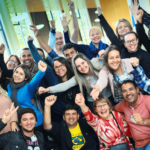
Tuomas Eerola, Ismo Turve & Marko Kallionpää
The reform of professional upper secondary education that entered into force in 2018 in Finland requires new operating methods. Teformi project supports the reform of professional education in the field of technology based on the development needs as recognized by the world of work and the VET institutions.
TEFORMI
Teformi project involves the following fields of technology: vehicle technology, mechanical and manufacturing engineering, electrical and automation technology, and building maintenance technology. Each of the sectors will establish their own development pilot, albeit the project also includes collaboration between the sectors.
The following objectives are at the heart of Teformi: strengthening cooperation with the world of work, promoting customer orientation, a multi-channel acquisition of competence, hybrid learning environments, career guidance, and a reform of the institutional culture of each educational institution. These development needs emerge from the significant changes in the world of work, progress of digitalisation, reformed legislation of professional education and training, renewed degree requirements, national assessments, as well as the regional development needs specified in the regional programmes of Kanta-Häme and Kymenlaakso.
The Teformi implementation network consists of three strong operators and their partners: Häme University of Applied Sciences, Kouvola Region Vocational College and Tavastia Vocational College. Thirteen companies and the Technology Industries of Finland are also involved in the development work. The project will run from 1 March 2018 to 31 August 2020. The project receives funding from the European Social Fund. Häme ELY Centre (Centre for Economic Development, Transport and the Environment) is the national authority responsible for the main financing of the project.
Teformi’s project plan defines the main characteristics of the development work. Each pilot determines the detailed objectives and development measures in their own development plan. The plans will be completed in autumn 2018. Each pilot has compiled an assessment of the current situation, which will provide the basis for the development plan. This article describes the results of the assessment carried out by the pilots. It is also worth following the Teformi blog and Teformi’s Facebook page. You can access the social media channels via http://www.hamk.fi/teformi.
Development needs of Teformi’s pilots
The objective is to create a developmental partnership for the fields of technology and transport that implements the professional education reform and responds to future competence requirements. Tavastia Vocational College is responsible for the development pilots in vehicle technology and mechanical and manufacturing engineering. Kouvola Region Vocational College (KSAO), in turn, is in charge of electrical and automation technology and building maintenance technology. HAMK Professional Teacher Education Unit supports the pedagogical development of the pilot.
The educational development needs were compiled through the development plan of the Teformi pilot. The professional institutions working as project partners drew up development plans for their own sectors in cooperation with their nominated teacher trainer. The plans revealed the following areas for further development to be implemented through the Teformi project in support of the professional training reform:
Table 1. Areas of development in Tavastia and KSAO.

Especially in the Hämeenlinna economic area, the job situation of the car industry is very good and employers in the area have even expressed that there is a strong shortage of workers. It would be possible to respond to specific skills needs that are required of the actors in the field (e.g. Patria) through both the reform of vocational training and the Teformi project activities that support the reform. This requires new modes of operation and building of study units using the students’ personal development plans. For example, the contents of the Vocational Education and Training that are beneficial for the business life, is described e.g. in 10 Steps to Success publication by the Confederation of Finnish Industries (EK).
A good example of the use of appropriate training equipment could be the Realwear HMT1 equipment tested by Kainuu Vocational College, which utilizes both added (AR) and virtual reality (VR). This type of new teaching model eliminates the physical constraints of teaching and guidance, thus serving not only the fluency of remote control, but also new thinking in vocational education.
All in all, the development needs of the participating sectors are well in line with the content of the professional education reform. Cooperation with the world of work, workplace supervisor training, development of multidisciplinary cooperation and electronic learning environments are essential parts of the reform’s implementation. On the other hand, the development of teachers’ professional competence and continuing education emerge as necessary components of the reform.
Teachers’ and counsellors’ career guidance skills
A survey mapping out the career guidance skills of teachers and counsellors of the institutions participating in the Teformi project was carried out between 1 May and 15 September 2018 in cooperation with the Työuralle (To a working career) project (ESF) managed by Kiipula Vocational Institute. The same survey was also extended to the Kettu project (ESF) managed by Salpaus Further Education.
In the Teformi project, fifteen members of the teaching and counselling staff replied to the survey. Based on the responses, the educational institutions’ counselling culture and the sharing of one’s own counselling competence emerged as areas for further development. Further information is required about the respondents’ views on how they perceive their own activities and competence, how the teacher takes into consideration the study capabilities of students, the objectives set by the students themselves, students’ life situation and ability to commit to the studies (motivation, interest in the field, responsibility).
The survey respondents replied in a very contradictory manner to the statement “Our school has invested in the development of career guidance and strengthening the counselling skills of personnel providing guidance”. More than half of the (53%) of the respondents were indecisive, 43 per cent disagreed with the statement, and 57 per cent agreed with it. There is also some room for improvement in the educational institutions’ ways of sharing competence. Altogether 47 per cent felt that, whenever required, they gained support in the development of their expertise in their own educational institution, while 53 per cent were either indecisive or of a different opinion.
The teaching and counselling staff agreed on the four different statements claiming that attention is paid in guidance to the study capabilities of students, the objectives set by the students themselves, students’ life situation and ability to commit to the studies. All either partly agreed (approx. 60% of respondents) or totally agreed (approx. 40% of respondents) with the statements.
The project’s data collection continues by consulting students of the participating educational institutions on their views on the implementation of the personal skills development plans (HOKS), as well as career guidance in the educational institutions. This will provide a point of comparison for the teaching and counselling staff’s views on their career guidance expertise and activities.
The objective is to arrange workshops in the participating educational institutions for the development of a community-led policy, guidance culture and expertise in career guidance.
Towards implementing the development plans
The reform of professional education sets challenges to both educational institutions and businesses in the field of technology. Personal learning paths, multi-channel learning and hybrid learning environments, increasing on-the-job learning and career guidance skills of teachers and workplace supervisors are challenges that the Teformi project will tackle.
The Teformi implementation of the pilots’ development plans has started in autumn 2018 and will continue in 2019. More results can be expected during the year 2019. The educational institutions’ and companies’ mutual commitment to the project’s implementation provides a good starting point for the plans’ implementation. The number of participating companies has already exceeded the goal stated in the project plan. The project has attracted a lot of interest, which has also increased expectations regarding the results.

Authors
Tuomas Eerola, Lic (ed), MSc (Tech) is Principal Lecturer and Project Manager at Häme University of Applied Sciences, Finland, and Executive Manager in Finnish Academy for Skills Excellence (FASE).
Ismo Turve, MSc IT, is Senior Lecturer at Häme University of Applied Sciences, Finland. His main topics of work are teaching in professional teaching education and working as a career guidance expert in different projects. His special interests along with development of teachers’ career guidance skills are e-learning and online teaching. Visit Ismo’s LinkedIn profile: https://www.linkedin.com/in/ismo-turve-a43203141
Marko Kallionpää, MSc (ed), is Lecturer in Professional Teacher Education at Häme University of Applied Sciences, Finland. He is Special Education Teacher and Career Guidance Counselor. His main topics of teaching are special education and career counselling in Finnish Ohjaamo One-Stop Guidance Centers. Marko is passionate about developing teaching methods and writing.





